By DAVID STREITFELD
Who doesn’t love buying online? It offers a bigger selection for less money, ordered from the privacy of your home and delivered there too. But if e-commerce is great for consumers, it is more problematic for citizens. The sales tax that people pay in physical stores helps pay for the upkeep of their communities. The physical stores also provide employment; these workers can afford in turn to buy things and thus keep the economy afloat. Few such benefits flow from e-commerce. California, with a colossal hole in its budget and 12 percent unemployment, is confronting this quandary as it tries to compel Amazon.com to collect sales tax. Amazon is so confident that bargain-hunting consumers will rally to its side that it is essentially ignoring the law. Maybe they will.
 But as the battle between the state and the retailer was heating up late last week, news came that Serendipity Books in Berkeley was closing. Antiquarian stores like Serendipity were once plentiful. They specialized in winnowing the detritus of the past, plucking the important material for collectors, scholars and institutions. Serendipity was for decades one of the best such shops, and eventually one of the last. In the years to come, people will have a hard time appreciating there were such places, where anyone who wanted to could look and learn and buy, or maybe just while away a rainy afternoon. So let’s spend a moment giving Serendipity its due.
The store was founded by Peter B. Howard in the early 1960s with the notion that the best bookshop in the world would have one copy of everything. It sometimes seemed as if Serendipity fulfilled this dream. Potential customers were confronted with a warren of rooms, some two stories high, with good books stuffed absolutely everywhere, including in shopping bags blocking the narrow aisles. Although there was clearly an underlying order, its nature was hard to discern; there were no signs. People would wander in a daze, sometimes asking, “Do you sell books here?” They thought it was a library or perhaps a museum.
The lack of direction was on purpose and in earnest. Mr. Howard wanted people to search for books and find not just what they were looking for but the book next to it, which they might want more if they only realized it existed. “The bookstore is an infinite array of material and knowledge of which you know nothing,” he said. “If you’re focused, you go to the library.”
Or, these days, you go online. Serendipity largely ignored the Web as a publicity and selling device and the Internet returned the favor.
But as the battle between the state and the retailer was heating up late last week, news came that Serendipity Books in Berkeley was closing. Antiquarian stores like Serendipity were once plentiful. They specialized in winnowing the detritus of the past, plucking the important material for collectors, scholars and institutions. Serendipity was for decades one of the best such shops, and eventually one of the last. In the years to come, people will have a hard time appreciating there were such places, where anyone who wanted to could look and learn and buy, or maybe just while away a rainy afternoon. So let’s spend a moment giving Serendipity its due.
The store was founded by Peter B. Howard in the early 1960s with the notion that the best bookshop in the world would have one copy of everything. It sometimes seemed as if Serendipity fulfilled this dream. Potential customers were confronted with a warren of rooms, some two stories high, with good books stuffed absolutely everywhere, including in shopping bags blocking the narrow aisles. Although there was clearly an underlying order, its nature was hard to discern; there were no signs. People would wander in a daze, sometimes asking, “Do you sell books here?” They thought it was a library or perhaps a museum.
The lack of direction was on purpose and in earnest. Mr. Howard wanted people to search for books and find not just what they were looking for but the book next to it, which they might want more if they only realized it existed. “The bookstore is an infinite array of material and knowledge of which you know nothing,” he said. “If you’re focused, you go to the library.”
Or, these days, you go online. Serendipity largely ignored the Web as a publicity and selling device and the Internet returned the favor.Mr. Howard might have created a wonder-filled shop, but on Yelp the reviews were few and grudging. One reviewer complained that prices were too high. Another said the store offered too little when it was buying your old books. Neither seemed to appreciate that the store could exist only because there was a merchant in the middle of these transactions trying to make a living, and that there was a benefit to the community that it was this way. Mr. Howard bought and sold collections as well as individual books, including the world’s greatest assortment of lost race fiction (a peculiar American fixation in the early years of the 20th century; Tarzan was its most famous exemplar); a 5,000-item gathering of material about baseball dating from 1819; proletarian literature from the 1930s; classic film scripts from all eras; geoscience and paleontology published between 1550 and 1850; pioneering collections of fiction and nonfiction about the oil industry and the Vietnam War. The store featured Carl Sandburg’s guitar and Jack London’s spears. The poetry sections were a trove of obscure versifiers, unrivaled by any store in the country. There were vast holdings of Canadiana, books in Russian from the early Soviet period, every book in seemingly every edition by John Steinbeck, from $20,000 inscribed copies of The Grapes of Wrath to paperback reprints. Mr. Howard believed in volume and breadth. You needed to know what you were doing to take advantage of Serendipity, which used to be the way the world worked. Finding the books was only the beginning. After you stumbled on things you wanted to take home – perhaps through persistence, perhaps by serendipity – you would be making a mistake to take your choices to the bookkeeper in her alcove, the closest the store had to a checkout till. Instead, the smart customer would take them up to Mr. Howard, pausing first to see if the Giants had won their most recent game.
The fortunes of the team often affected how much he would charge for books. This quirk was so pronounced it was immortalized in print. In Samuel Gottlieb’s “Overbooked in Arizona,” the tale of a book collector gone mad, the protagonist is driving from Phoenix to Berkeley to buy books at Serendipity when the Giants lose a game they had been winning. He cuts across the median and heads back home, knowing the trip is now in vain.
If your chosen books were already priced, Mr. Howard almost always lowered the sum demanded for each unless he didn’t like you. If they were unpriced, four out of five would be less than you hoped while one would be much more. But you had to take all of them if you wanted a similar deal next time. The books would be written up by hand on an invoice, a tedious process but on Saturdays Mr. Howard nourished all comers with pastries and coffee. When the books finally changed hands, money did not necessarily follow. Like a good bar, which in some ways it resembled, Serendipity allowed customers to run a tab and pay more or less when they wanted. As I write this, I owe $388.
Suppose you took a book home and belatedly decided, for whatever reason, you did not want it? All Serendipity catalogs were emblazoned with the remark, “Any book may be returned for any reason.” I returned a book. Once. As Mr. Howard complained about my bad faith, I referred to the guarantee. Mr. Howard’s wife, Alison, who was listening, responded sweetly: “We said we’d accept back any book. We didn’t say we’d do it happily.”
Downloading ebooks was nothing like this. Serendipity was a refuge and an education.
And sometimes a pain. Mr. Howard could be a difficult man. “He always had an instant answer he would throw in your face in the manner of some biblical prophet,” the bookseller David Mason wrote. Yet he was also wildly generous, a quality never more on display than in his famous biannual parties when the store would be swept clean and a fabulous all-day feast put on, with suckling pigs and fine wine. It was a way of rooting himself in the community. Customers would walk in with an interesting tale and interesting books, and Mr. Howard would buy them. “Because I own the building, I can have a lot of books, and because I have a lot of books in a visible place, things can happen,” he said.
Mr. Howard was too irascible to train a successor but when he developed pancreatic cancer two years ago, he began trying to sell the store. The price would have been about the seven-figure sum that it takes to buy a nice house in Berkeley, a pittance really. There were no takers. Who wants a half-million books in the Internet Age?
The bookseller was 72 when he died on March 31, Opening Day, while watching his beloved Giants. He checked out in the bottom of the sixth, when the score was still 0-0 and before the Giants could lose. The store hung on a couple more months as the Howard family considered its options. Late last week, Nancy Kosenka, Mr. Howard’s longtime deputy, posted on her Facebook page that Saturday would be it. Sales were brisk. Late in the afternoon, a first-time customer walked in, scanned the shelves in bewilderment and inevitably asked, “Do you sell books here?” Not anymore.
Jack Ehlers
Minneapolis, MN
Another loss in Berkeley. One of the first was the closure of Kody's books on Telegraph (then the space was used annually as a Halloween outlet store).
I spent a lot of time at Serendipity. One of my prized finds was a first edition by Lewis Mumford in which it included a hand-written note and envelope sent by the author in the mid-1940's. Mr. Howard charged me no more for it.
Better yet, I once brought to Mr Howard a friend's old book in which we thought might be a rather valuable copy of Camus' The Stranger. Mr Howard took it in his hands and without another thought said to me tersely, 'The French would never publish Camus on paper like this...' Lesson learned.
Sad day for books--which I still consider provide, when expertly written, designed and published, a far superior experience and tool than anything online.
Ron Stern, Florida
What ever happened to the idea of "print on demand," wherein a bookstore could print and bind a book for you on the spot (for a reasonable fee)?
Thomas Beck
Princeton, NJ
Hearing about Peter Howard, he reminds me a bit of Fred Bridge, the late owner of Bridge Kitchenware, a legendary cooking store in Manhattan. He had the reputation of being the meanest man in New York - he'd stand at the door of his shop and not let you in if he thought you weren't a serious shopper! In the days before Williams Sonoma and other places were everywhere, it was THE place to buy really good and at the time hard to find cookware. Now you can find anything and everything with a mouse click or two, but when I started cooking seriously in the late 1970s and early 1980s, Bridge Kitchenware was just about the only place you could find certain items. Sounds like Peter Howard and Serendipity Books were similar.
Capt Concer...
Midwest
Bookstores are a thing of the past. Let's get with the times and digitalize it all. Who has time to go to the bookstores anymore and actually wander around and look for books? Probably the same people that drive in slow in the fast lane in their big gas guzzling SUV's back to their McMansion's.
Save time, gas and money. Buy it from Amazon.
striving
WA
As much as I love books, I would have hated that store. Give me signs and prices any day, and skip the capricious and grouchy proprietor.
Miles
Long Beach, CA
It's a shame that most bookstores aren't adapting to online systems. They could remain in business if they formed a 'netflix' of books. Acres of Books was my favorite book store and they closed a few months ago. Books are still in use everywhere, it's just the way we get them that has changed. I think online shopping should have a sales tax, if it remains taxless we will find ourselves in a bad situation when no one goes to actual stores anymore. It is sad when these stores close but the world is not going to stop the direction it's moving. Internet shopping is not going to help the recession unless a tax happens soon, especially cause Amazon, the biggest of these internet shopping companies, is desperately fighting the issue to avoid tax.
Cindy
La Jolla, CA
Wahrenbrock's Book House at 7th and Broadway in downtown San Diego closed in 2009, a huge loss to book lovers. The shop had amazing collections of history, cooking, sci-fi, Americana, politics, fiction, ...stacked to the rafters on multiple floors. It was a wonderful place to browse and learn and look, hands on. Maybe someday it will be possible again to have a viable business with this kind of collection.
prodman1
Santa Fe, NM
In Santa Fe we have Big Star Books, which is thriving. Every Saturday morning when I go in there just to see what's new, they have crates of books packaged and waiting for pick up by whatever delivery service. Bookstores can serve the web and real people. Serendipity lives. But, in our lucky case, you can have a great looking girl you can read Rumi poems to instead of an ornery old man. And she likes them, too.
kdj
Silicon Valley, CA
Sadly, this is evidence of further erosion of a once-literate American culture. The Bay Area had numerous shops like Serendipity from SFO and Berkeley down to Palo Alto and San Jose. Not anymore. For those of you with radical/progressive tastes, I'd recommend Bolerium Books in San Francisco (bolerium.com). They have one of the largest collections of social movement literature anywhere, they service libraries and private collections,are visitor-friendly, and have adapted in part to the Internet Age. Helpful staff, too.
.
Jen
Los Angeles, CA
I'd be slightly overwhelmed as well without any signs, like "striving" commented, but it is unfortunate that so many bookstores are going out of business. Although I understand that transitioning books into the digital world is more efficient in both monetary and resource terms, there's something special about being in a bookstore and having pages to physically turn while reading.
Also, with all these independent bookstores closing down, I'll miss the feeling of entering a random shop without a real purpose. I feel that online you search for what you're exactly looking for, making the entire experience predictable and systematic. Sure it's convenient to purchase needs so easily but it's always nice to "stumble upon" things by mere happenstance every once in awhile.
Keasley Jones
Berkeley, CA
Shopping Amazon is like going to the visitor center at Yosemite. Shopping Serendipity was like scrambling off-trail in the high country.
Richard Gor...
Berkeley, CA
Serendipity Books was not merely a good used book store, it was a great, world class bookstore. Yes, Peter was eccentric and sometimes rude, but his passion and knowledge of books, and his fairness at worst, his generosity at best balanced out. If his prices were sometimes on the high side, you could sit in the store and read for an hour, and then decide to buy or not buy. I was fortunate to know him as a customer, and Berkeley has lost something irreplaceable.
Christopher...
San Francisco, CA
I was looking for a 1960 Viking Press paperback edition of Grapes of Wrath. My copy loaned to a writer that I guess became a gift to him back in 1976/77. Such bookstores fueled my discovery and love of books, on rainy and sunny afternoons. Rest in peace Serendipity!
Eddie
Long Beach, CA
It is so sad that independent book stores like Serendipity are going out of business all because of websites like Amazon. Where is the authenticity in buying a book nowadays? Where is the butterfly feeling in the stomach when one would slowly creep up on a bookshelf in order to find what mystical secretive book awaited? I'll tell you where; in the morgue! There's there no justice in this world anymore? One bright side to see is that people are now getting lazier and lazier because they prefere to have books they can't actually touch or explore be sent to thier house for lack of wanting to get off thier bottoms. Then again there is the gas price issue, but that's beside the point! The point is that America is supposed to be the epitome of a country that has independent and loving businesses so that they can, in turn, give employment to those in need.


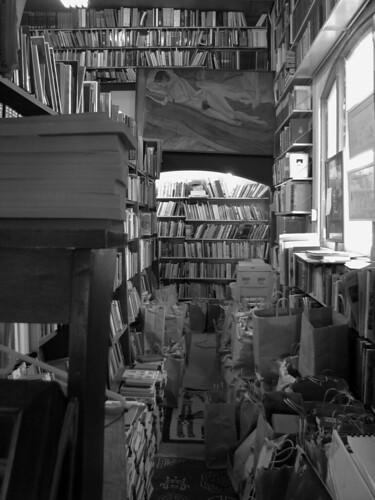
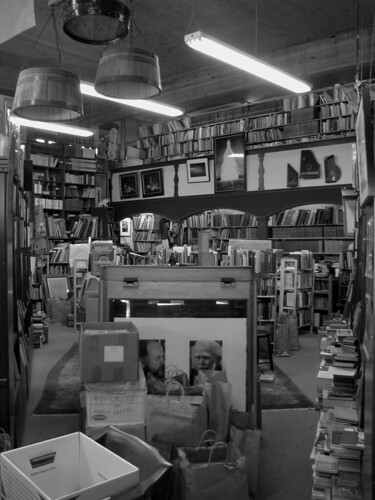
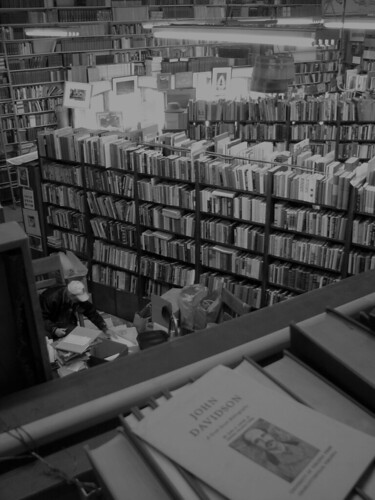
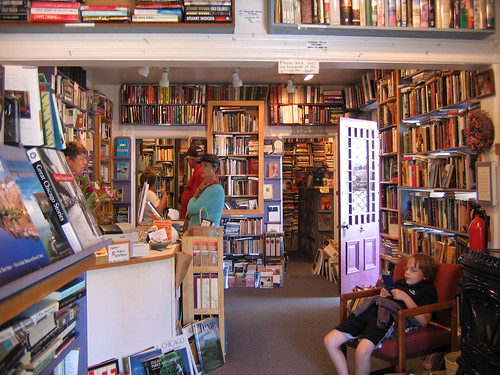
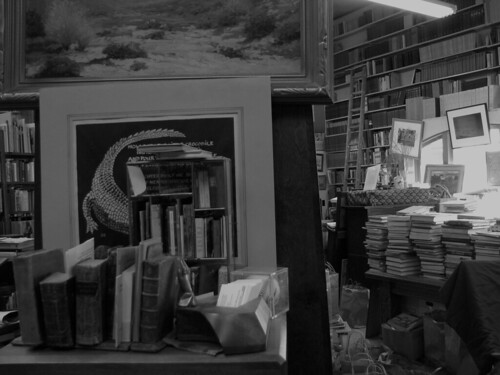
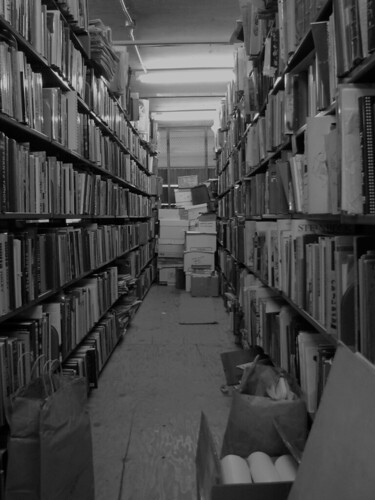
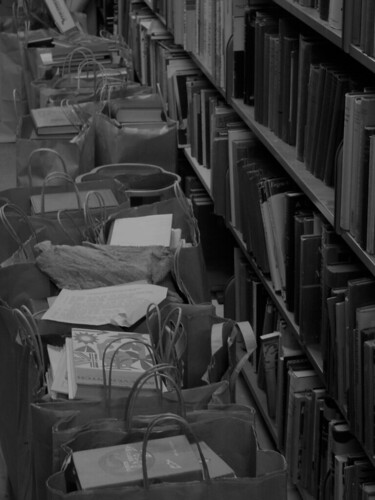
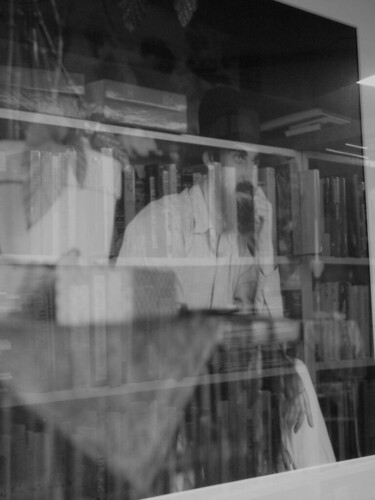
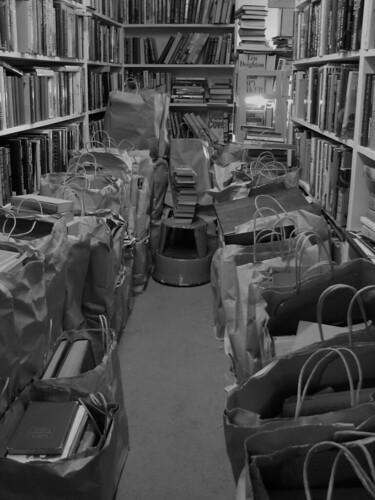
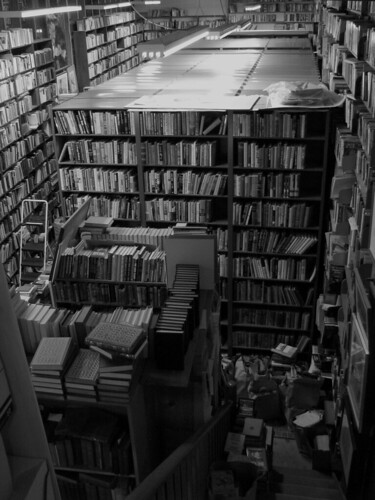
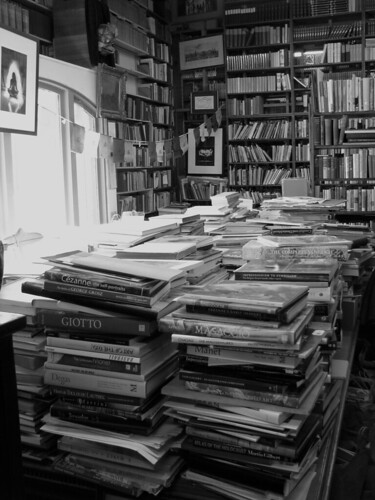
2 comentarii:
Nice article. I do appreciate that my photographs are credited when you mouse-over them, but it would be great to see them each credited underneath the image as a caption. Thank you.
Dear Miss Fortunate, I would first like to thank you for the visit and the photos. For the photos on this blog, I use(d) the Flickr default. Let me see what I can do about making it right for you.
Since you seem to know and like Serendipity, are there any parting thoughts you may like to share?
Trimiteți un comentariu